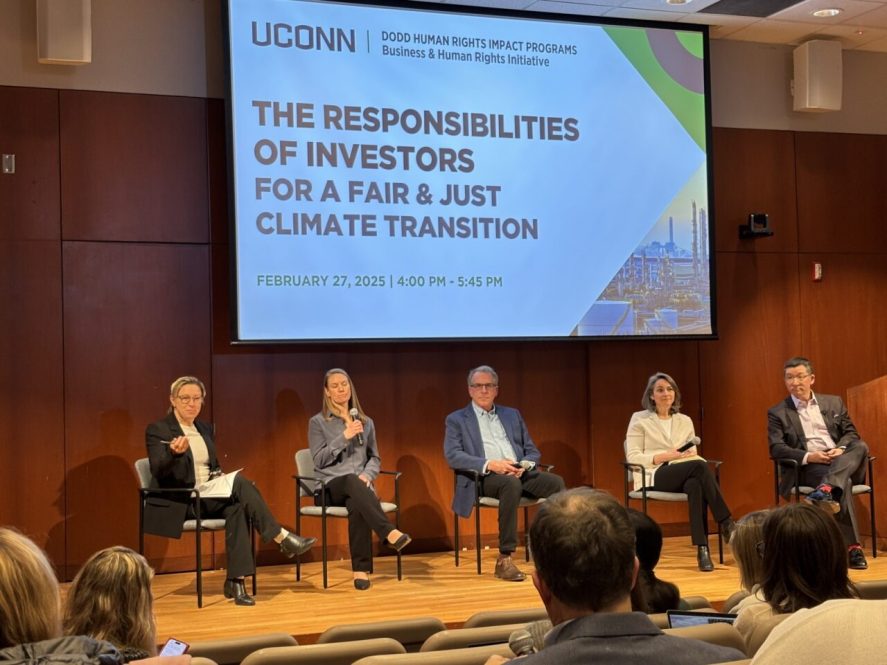State Treasurer Discusses Inclusive Investment Strategies for a Sustainable Future
During a keynote speech at The Dodd Center for Human Rights on February 27, State Treasurer Erick Russell emphasized the crucial role of investors in facilitating a just transition to a sustainable economy. This address marked the beginning of a two-day conference organized by the Business and Human Rights Initiative at the University of Connecticut (UConn). Russell highlighted that the shift towards achieving net zero carbon emissions would predominantly impact workers and communities, underscoring the importance of prioritizing employee wellbeing as businesses and investors work to reduce emissions and enhance the renewable energy sector.
Balancing Sustainability Goals with Human Rights
Russell urged that while the focus remains on reaching net zero targets, the approach must also safeguard human rights. He stressed the importance of ensuring that the transition does not neglect any group within society. “Our sustainability objectives must be inclusive, ensuring that no one is marginalized in the process,” he stated. He advocated for companies to take an active role in this transition by investing in the reskilling of their workforce, enabling employees to acquire the necessary skills for emerging green jobs. This approach aligns with the principles of a just transition, which aims to develop a green economy while upholding and respecting the rights of workers.
The Investor’s Role in Climate Action
Russell pointed out the transformative potential that investors hold in combating climate change. He stated, “Investment can be a powerful driver for the shift towards renewable energy, enhance agricultural practices, and foster technological advancements—all contributing to this vital transition.” He called on investors to recognize their significant impact on reducing climate risks and promoting the establishment of a green economy.
The Need for Transparency in Just Transition Initiatives
Russell emphasized that engaging in discussions about just transitions is essential for investors. He acknowledged the progress made in this area but noted that increased transparency is still necessary to achieve effective results. Following his speech, a panel discussion ensued, moderated by Stephen Park and Rachel Chambers, both professors of Business Law and co-directors of the Business & Human Rights Initiative.
Responsible Business Practices and Human Rights
Mary Beth Gallagher, a panelist and asset manager at Domini Impact Investments, shared her perspective on the importance of responsible management of challenges in the long term. She asserted that companies that navigate these issues effectively are likely to outperform their competitors. “We strive to deliver sustainable and equitable returns for our investors, and we believe that addressing human rights responsibilities is fundamental to a company’s success,” Gallagher explained.
Addressing Inequality as a Path to Climate Solutions
Paul Rissman, Co-Founder of Rights CoLab, contributed to the discussion by linking human rights and climate change. He stated, “You cannot address climate issues without first tackling inequality and human rights challenges. Once those are resolved, addressing climate change becomes significantly easier.” The panelists agreed that government involvement at all levels is critical for implementing a just transition to a sustainable economy, with state policymakers playing a particularly innovative role in developing laws and practices to confront these challenges.
Encouraging Dialogue for Effective Change
Kindra Mohr, Associate Director at Financial Services and Human Rights at BSR, expressed optimism about the growing collaboration between municipal and state governments. She noted, “There is increasing activity across various levels of government, working together to address these pressing issues.” After the panel discussion, attendees were encouraged to engage in a lively question-and-answer session, addressing topics such as how students can participate in promoting just transitions while ensuring workers’ livelihoods are protected.
Gallagher emphasized the need for improved communication between companies and communities to facilitate this process. “Finding a better way is essential, and fostering dialogue is crucial,” she stated. Stephen Park highlighted that the Business and Human Rights Initiative focuses on ensuring that ethical business practices are grounded in human rights considerations. He remarked on the collaborative effort to investigate the human rights implications of climate transition, noting that UConn was an ideal venue for such a gathering.
This event was made possible through the partnership program between the Gladstein Human Rights Institute and the UConn School of Business, under the auspices of the Business and Human Rights Initiative.

